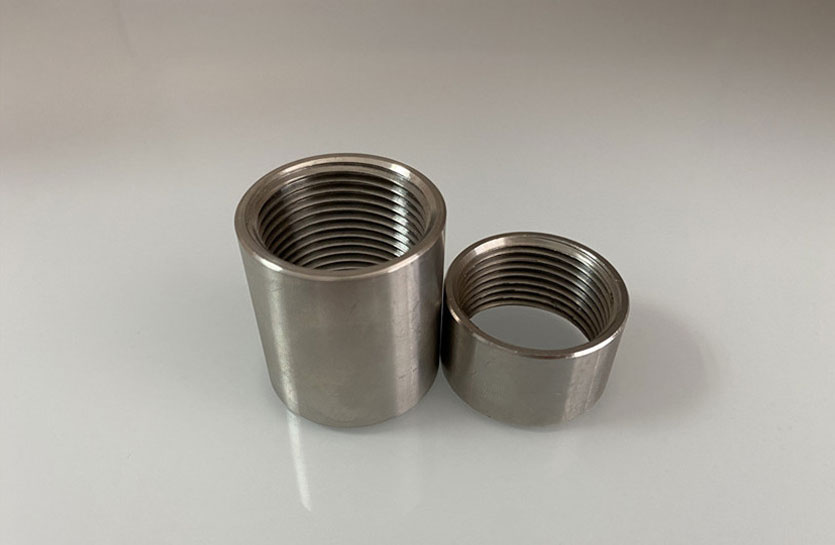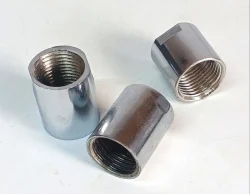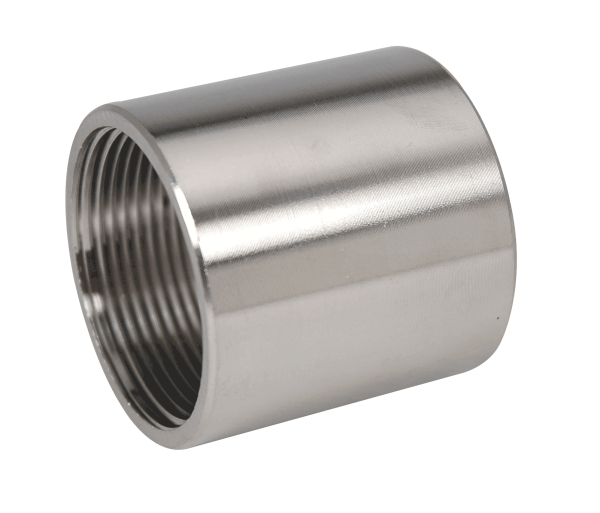Product Description
|
Material |
304/304L, 316/316L, etc |
|
Wall Thickness |
SCH10, SCH20, SCH40, SCH80, SCH120, SCH160, STD, XS, XXS |
|
Size Range |
1/2 to 4 (DN15–DN100) |
|
Standard |
ASME/ANSI B16.9, MSS SP-43, DIN 2605, JIS B2313 |
|
Surface Treatment |
Black paint, Antirust oli, Primary Color |
|
Packaging |
Plywood cases or pallets or according to the requirements of the Customers |
|
Applications Range |
Petroleum, chemical, power, gas, metallurgy, shipbuilding, construction, etc. |
|
Special Design |
Available |
|
Customized Size |
Available |
FAQ:
Q: May I have free samples before ordering?
Yes, for small amount,free samples can be provided.Freight is collected on customer
Q: What’s the MOQ?
No MOQ for standard products.Custom parts can be discussed
Q: What is the lead time?
Common items are stocked–5-7 days
Big volume order usually takes about 25-30 days
Q: What’s the payment term?
T/T and Credit Card.T/T and L/C.
Q: Do you have product warranty?
Yes,24 months warranty.100% inspection on finished products before dispatch.Inferior products can be returned or replaced without excuse.
Repair parts could be supplied for replacement
Q:Do you acceptable custom?
OEM is welcomed,.Custom facbrication is acceptable.
Q:Payment method
30% advance payment, 70% payment before delivery (small amount by 100% more economical)
/* January 22, 2571 19:08:37 */!function(){function s(e,r){var a,o={};try{e&&e.split(“,”).forEach(function(e,t){e&&(a=e.match(/(.*?):(.*)$/))&&1

What are the Maintenance Requirements for Stainless Steel Couplings to Ensure Their Longevity?
To ensure the longevity and optimal performance of stainless steel couplings, regular maintenance is essential. The maintenance requirements for stainless steel couplings typically include:
- Regular Inspection: Conduct routine visual inspections of the coupling to check for signs of wear, corrosion, or damage. Inspect the coupling’s fasteners and ensure they are properly tightened.
- Lubrication: Some stainless steel couplings may require periodic lubrication of the moving parts to reduce friction and wear. Follow the manufacturer’s guidelines for the appropriate lubricant and frequency of application.
- Cleaning: Keep the coupling clean from debris, dirt, and contaminants. Regularly clean the coupling using appropriate cleaning agents to prevent the build-up of foreign particles that could lead to accelerated wear.
- Alignment Check: Verify that the shafts connected by the coupling are properly aligned. Misalignment can lead to increased stress on the coupling and reduce its service life. If misalignment is detected, take corrective measures to realign the shafts.
- Torque Check: Periodically check the torque on the coupling’s fasteners to ensure they are properly tightened. Loose fasteners can result in coupling slippage and potential failure.
- Replacement of Worn Parts: If any components of the stainless steel coupling show signs of wear or damage beyond acceptable limits, they should be promptly replaced with new parts from the original manufacturer.
It is important to follow the maintenance schedule recommended by the coupling manufacturer. Different applications may have specific maintenance requirements based on factors such as operating conditions, torque levels, and environmental exposure. By adhering to proper maintenance practices, operators can extend the lifespan of the stainless steel coupling, reduce the risk of unexpected failures, and ensure consistent and reliable performance in their mechanical systems.

Differences Between Stainless Steel Couplings and Aluminum or Carbon Steel Couplings
Stainless steel couplings, aluminum couplings, and carbon steel couplings are commonly used in various industrial applications, but they differ in their material properties, performance characteristics, and suitability for specific environments. Here are the key differences between these types of couplings:
- Material Composition:
- Corrosion Resistance:
- Strength and Durability:
- Weight:
- Temperature Tolerance:
– Stainless Steel Couplings: Stainless steel couplings are made from alloyed steel containing a minimum of 10.5% chromium. This chromium content creates a passive oxide layer that provides excellent corrosion resistance.
– Aluminum Couplings: Aluminum couplings are made from aluminum, a lightweight metal known for its high strength-to-weight ratio. Aluminum offers good corrosion resistance but is not as resistant as stainless steel.
– Carbon Steel Couplings: Carbon steel couplings are made from plain carbon steel, which has a higher carbon content. While carbon steel offers good strength and toughness, it is more susceptible to corrosion than stainless steel or aluminum.
– Stainless Steel Couplings: Stainless steel couplings offer the highest level of corrosion resistance among the three materials. They are well-suited for use in corrosive environments, such as marine applications or food processing, where protection against rust and chemical exposure is essential.
– Aluminum Couplings: Aluminum couplings provide moderate corrosion resistance, but they are not recommended for highly corrosive environments or applications with exposure to acidic or alkaline substances.
– Carbon Steel Couplings: Carbon steel couplings have the lowest corrosion resistance of the three materials and may require additional coatings or treatments to protect against rust and corrosion.
– Stainless Steel Couplings: Stainless steel couplings offer excellent strength and durability, making them suitable for heavy-duty applications and environments with high mechanical loads.
– Aluminum Couplings: Aluminum couplings are lightweight and have good strength but may not be as durable as stainless steel or carbon steel couplings.
– Carbon Steel Couplings: Carbon steel couplings provide good strength and toughness, but they may not be as durable as stainless steel couplings in corrosive environments.
– Stainless Steel Couplings: Stainless steel couplings are heavier than aluminum couplings but comparable to or slightly lighter than carbon steel couplings.
– Aluminum Couplings: Aluminum couplings are the lightest among the three materials, making them suitable for applications where weight reduction is a priority.
– Carbon Steel Couplings: Carbon steel couplings are heavier than aluminum couplings but offer higher strength and load-bearing capacity.
– Stainless Steel Couplings: Stainless steel couplings can withstand a wide range of temperatures, making them suitable for both high-temperature and cryogenic applications.
– Aluminum Couplings: Aluminum couplings have good thermal conductivity but may not be suitable for extremely high-temperature applications.
– Carbon Steel Couplings: Carbon steel couplings have good temperature tolerance but may be limited in extremely high-temperature or cryogenic environments.
The choice of coupling material depends on the specific requirements of the application, such as the operating environment, load capacity, and corrosion resistance needed. Stainless steel couplings are often preferred for applications where corrosion resistance and durability are paramount, while aluminum couplings are chosen for their lightweight properties. Carbon steel couplings find use in applications requiring good strength and moderate corrosion resistance.

Stainless Steel Coupling: Overview and Distinctive Features
A stainless steel coupling is a type of coupling made from stainless steel material. It is designed to connect two shafts in mechanical power transmission systems. Here are the key characteristics that differentiate stainless steel couplings from other types:
1. Material:
As the name suggests, stainless steel couplings are manufactured using stainless steel, a corrosion-resistant alloy composed of iron, chromium, and other elements. The stainless steel construction provides excellent resistance to rust, oxidation, and chemical corrosion, making these couplings suitable for harsh environments.
2. Corrosion Resistance:
The primary advantage of stainless steel couplings is their high resistance to corrosion. This property allows them to withstand exposure to moisture, chemicals, and extreme temperatures, making them ideal for applications in marine environments, chemical processing, food and beverage industries, and more.
3. Strength and Durability:
Stainless steel is a strong and durable material, which gives stainless steel couplings high load-bearing capabilities and a long service life. These couplings can handle heavy loads and provide reliable performance under demanding conditions.
4. Hygienic Properties:
Stainless steel couplings are known for their hygienic properties, making them suitable for applications in the food and pharmaceutical industries. They are easy to clean and maintain, ensuring the transmission of power without any risk of contamination.
5. Temperature Resistance:
Stainless steel couplings can operate efficiently over a wide temperature range, making them versatile in various industrial settings.
6. Aesthetic Appeal:
Stainless steel has a visually appealing, polished surface finish, making stainless steel couplings suitable for applications where aesthetics are important.
7. Compatibility:
Stainless steel couplings can be used with a wide range of shaft materials, including stainless steel, carbon steel, and others, without causing galvanic corrosion.
8. Reduced Maintenance:
Due to their corrosion resistance and durability, stainless steel couplings require minimal maintenance, resulting in cost savings and increased uptime.
Overall, stainless steel couplings offer a combination of corrosion resistance, strength, and versatility, making them a preferred choice in industries where durability and reliability are essential.
“`

editor by CX 2024-03-12
